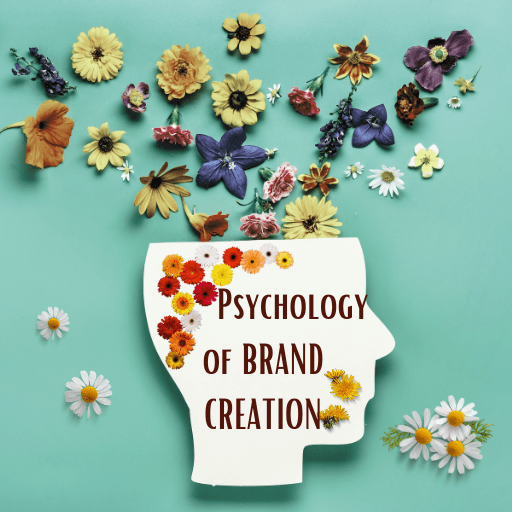
The Psychology of Brand Creation
Influencing Perception and Loyalty
PSYCHOLOGY OF
BRAND CREATION
Brands are more than just logos and slogans; they are complex constructs that influence our perceptions and behaviors in powerful ways. In the modern marketplace, where consumers are inundated with choices, understanding the psychology of brand creation is essential for businesses seeking to stand out, create meaningful connections with their audience, and foster unwavering brand loyalty.
The Significance of Branding
Branding is not a new concept. It has been around for centuries, from the cattle branding of the American West to the intricate logos and advertising campaigns of today. However, the digital age has elevated branding to a new level of importance. In a world of endless choices and information overload, consumers often rely on brands as shortcuts to decision-making.
The Power of Perception
Perception is at the heart of branding psychology. How your brand is perceived determines whether customers choose your product or service over others. Brand perception encompasses a range of elements, including:
- Visual Identity:
Logo: Your logo is often the first thing people associate with your brand. It should be distinctive and memorable.
Colors: Colors evoke emotions and associations. For example, blue often represents trust and reliability, while red can convey excitement and passion.
Typography: The style and font you choose for your brand’s name and messaging can convey various traits, from elegance to playfulness. - Brand Storytelling: The narrative you build around your brand can deeply influence consumer perceptions. A compelling story can create an emotional connection, making your brand more relatable and memorable.
- Consistency: Consistency across all brand touchpoints, from your website to your social media posts, reinforces brand recognition and trust.
- Associations and Values: Consumers often associate brands with values. For instance, brands like Patagonia are closely associated with environmental responsibility and sustainability.
- User Experience: The ease with which customers interact with your brand, whether through your website or in-store experience, plays a crucial role in shaping perceptions.
The Psychology of Brand Loyalty
Brand loyalty is the holy grail of marketing. When customers are loyal to your brand, they not only continue to buy from you but also become brand advocates, referring friends and family. Understanding the psychological factors behind brand loyalty can help businesses foster it effectively.
- Trust and Consistency: Trust is fundamental to loyalty. Brands that consistently deliver on their promises build trust over time. Any inconsistency can erode that trust quickly.
- Emotional Connection: People often form emotional connections with brands that align with their values or evoke positive feelings. Apple, for instance, has a cult-like following due to its emphasis on design and innovation.
- Perceived Value: Customers perceive value beyond the product or service itself. This includes factors like customer service, convenience, and overall experience.
- Community and Identity: Some brands create communities around them. These communities can provide a sense of belonging and identity for their customers. Harley-Davidson is a prime example of this phenomenon.
Habitual Behavior: When consumers develop habits around a brand, it becomes challenging for competitors to break into their routines. This is particularly prevalent in industries like technology and fast-moving consumer goods.
The Role of Cognitive Biases
Cognitive biases are systematic patterns of deviation from norm or rationality in judgment, often a result of information processing shortcuts. These biases play a significant role in how we perceive and interact with brands.
- Confirmation Bias: People tend to seek out information that confirms their existing beliefs. Brands can leverage this by aligning with popular beliefs and values.
- Anchoring Bias: Our decisions are often influenced by the first piece of information we receive. Brands can use this by strategically presenting pricing and features.
- Halo Effect: When people perceive one positive trait about a brand, they tend to assume other positive traits. Brands can build on this by emphasizing a single strong trait.
- Reciprocity Bias: People feel compelled to give back when they receive something. Brands can create loyalty by offering value, whether through discounts, exclusive content, or excellent customer service.
Branding in Action: Case Studies
To illustrate the psychology of brand creation, let’s delve into a few case studies of successful brands that have harnessed these principles effectively.
- Apple Inc.: Apple has masterfully leveraged the psychology of branding. They’ve created a brand known for innovation, simplicity, and design excellence. The emotional connection with Apple products goes beyond just technology; it’s about a lifestyle and identity. Apple consistently delivers on its promise of quality, reinforcing trust and loyalty.
- Coca-Cola: Coca-Cola has a long history of effective branding. The brand is synonymous with happiness and refreshment. Their iconic red and white color scheme and distinctive script font are instantly recognizable. Coca-Cola has used storytelling in its marketing for decades, connecting with consumers on a personal and emotional level.
- Nike: Nike’s “Just Do It” slogan is a perfect example of the power of a concise, compelling message. Nike has created a community of athletes and fitness enthusiasts who identify with the brand’s values of determination and excellence. The brand’s consistent visual identity and use of celebrity endorsements reinforce its message.
Practical Strategies for Brand Creation
Understanding the psychology of branding is one thing, but how can businesses put this knowledge into practice? Here are some practical strategies for effective brand creation:
- Define Your Brand’s Personality: Clearly define your brand’s personality traits. Is it innovative, reliable, friendly, or adventurous? Ensure every aspect of your brand aligns with these traits.
- Tell a Compelling Story: Craft a narrative around your brand that resonates with your target audience. Make it emotionally engaging and memorable.
- Consistency is Key: Maintain consistency in your branding across all touchpoints, from your website and social media to packaging and customer service.
- Leverage Social Proof: Highlight customer reviews, testimonials, and user-generated content to build trust and show that others value your brand.
- Create a Brand Community: Foster a sense of belonging by creating a community around your brand. Engage with customers on social media, host events, and encourage user-generated content.
- Offer Value: Go beyond the product or service itself. Provide valuable content, resources, or exclusive offers to your audience.
- Experiment and Adapt: Stay attuned to changing consumer preferences and market trends. Be willing to adapt your branding strategy as needed.
Conclusion
The psychology of brand creation is a multifaceted and dynamic field that combines elements of design, storytelling, and human behavior. Successful brands understand the power of perception and the psychology behind it. They use this knowledge to not only differentiate themselves in a crowded marketplace but also to build lasting connections with their audience.




